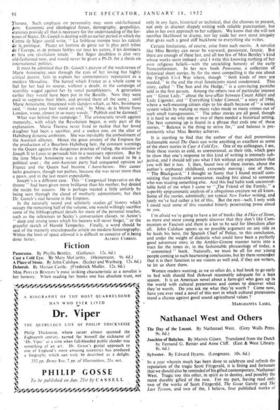The Children of Maria Theresa
THE greatest of the Habsburgs since Charles V rightly gives her name
to the title of this book. Seen in her voluminous correspondence with and about her children, Joseph and Marie Antoinette, she occupies half the volume ; and one cannot but feel that while Dr. Gooch's mind, with its capacity for cibar, cool summary, is displayed in the historiographical studies which follo‘V, his heart is with Maria
Theresa. Such emphasis on personality may seem old-fashioned tow. Economic and ideological forces, demography, geopolitics, statistics provide all that is necessary for the understanding of the for- tunes of States. Dr. Gooch is dealing with an earlier period in which the Comte de Segur could write, " La foiblesse trompe tous les calculs ile Places un homme de genie sur le plus petit tame de ('Europe, et de princes foibles sur tous les autres, it les dominera et fera une revolution totale." But Segni- doubtless is also very old-fashioned now, and would never be given a Ph.D. for a thesis on international politics.
It must be admitted that Dr. Gooch's picture of the weaknesses of Marie Antoinette, seen through the eyes of her loving but highly critical parent, fails to explain her contemporary reputation as a modern Messalina. The hatred which France as a whole came to feel for her had its- source, without a doubt, in the campaign of scurrility waged against her by venal pamphleteers. A generation earlier they would have been put in the Bastille. Now they were paid to suppress their libels, and printed them all the same .; until Marie Antoinette, threatened with slanders which, as Mrs. Swinburne said, ". make your hair stand on end," by Mme. de la Motte from London, wrote, almost in so many words, " Publish and be damned."
What was behind this campaign ? The aristocratic revolt against monarchy, with which the Revolution began, is only part of the explanation. Maria Theresa never lived to realise that her loved daughter had been a sacrifice, and a useless one, on the altar of Habsburg dynastic ambition. She was inevitably the embodiment of the Austrian alliance. Hence the great anxiety of the Empress for the production of a Bourbon-Habsburg heir, the constant warnings to the Queen against the dangerous practice of riding, the mission of Joseph 11 to Louis to persuade him to a necessary operation. But by the time Marie Antoinette was a mother she had ceased to be a political asset ; the anti-Austrian party had conquered opinion Mt France and the Queen had become l' Autrichienne. Her career lacks greatness, though not pathos, because she was never more than a pawn, and in the last resort expendable.
Joseph's is a different case. This ' • Categorical Imperative on the throne " had been given more brilliance than his mother, but denied the recipe for success. He is perhaps treated a little unfairly by being seen through the cloud of motherly admonitions, but then Dr. Gooch's real heroine is the Empress.
In the naturally sound and scholarly studies _of history which occupy the remaining half of the volume, one would willingly sacrifice some of the bibliographical details for more of the personal touches, such as the references to Seeley's conversation classes, to Acton's " deep and strong tones which his hearers will never forget," or the graceful sketch of Harold Temperley. Finally, a word should be said of the masterly encyclopaedia article on modern historiography. Within the limit of space allowed it is difficult to conceive of it,being



































 Previous page
Previous page